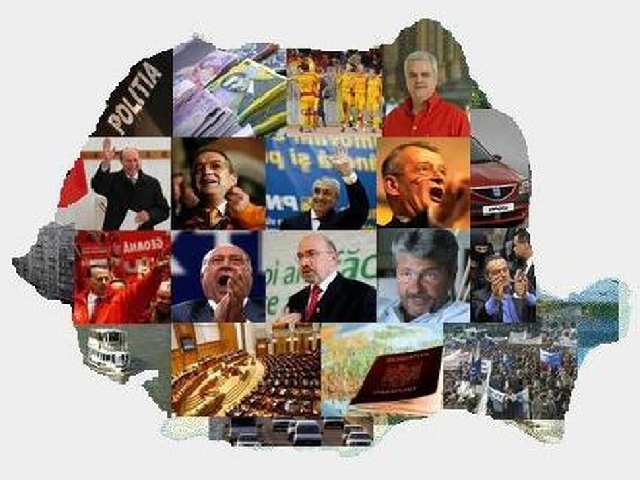The Year in Review in Romania
A retrospective of the main domestic events in Romania in 2015

Newsroom, 02.01.2016, 14:01
THE event of the year
2015 in Romania was the devastating fire at the Bucharest nightclub ‘Colectiv’,
which killed more than 60 young people. On the night of October 30th, hundreds of young people, who were attending
a rock concert, fell victim to the fire caused by the fireworks used by the
band during the concert, although the conditions for such a fireworks show were
improper. The spontaneous solidarity of the people, who mobilized for an
unprecedented humanitarian effort, was impressive. The Romanian authorities
declared three days of national mourning and the place of the tragedy turned
into a huge, open-air altar where Romanians, irrespective of their status, laid
flowers and lit candles. One day after the tragedy, a spontaneous march of
silence took place: as many as 10 thousand people of all ages, dressed in black,
marched on the streets of Bucharest in deep silence, which was more shattering
than a yell of pain.
When the national mourning was over, three times more
Romanians went out to the streets again to vent their feelings of revolt
against the authorities’ corruption and indifference, because in their opinion,
that was the cause of the most serious tragedy registered in Romania in the past decades. Saying it would
be a mistake to ignore the discontent of the people, the then Prime Minister,
Victor Ponta, resigned. After consultations with representatives of the
parliamentary parties and, for the first time, with civil society
representatives, on November 10th President Klaus Iohannis entrusted
Dacian Cioloş, a former European Commissioner for Agriculture, with the
formation of a new, technocratic government, made up of efficient ministers,
with a clean record. The Cioloş cabinet was invested by Parliament on November
17. About one month later, the government scored its first success, as
Parliament endorsed, by a large majority, the state and social security budget
bills for 2016. Healthcare, education, defense and investments are considered
priority domains alongside economic growth, which should be reflected in the
living standards of each and every Romanian. And, in president Iohannis’s vision, the year that is about to start
should be a year of change too, with Romanians beginning to trust their
politicians again.
As
renewing politicians’ ideas and practices cannot be done without eradicating
corruption, in 2015 the Romanian judiciary continued its offensive, by exposing
elements of the scourge that has been marring Romanian society for years. Both
right and left-wing politicians, who, protected by immunity, thought they were
above the law, or powerful business people imagining they could buy anything
and anybody, were summoned and heard by the National Anti-corruption
Directorate. The list of convicts included former ministers, MPs, mayors, local
and county councilors, prosecutors, judges, notaries public, police officers,
army generals and officials with the Interior Ministry, as well as directors of
state-owned companies.
As
regards foreign affairs, in 2015 Romania displayed solidarity with the other
member countries, as the EU was faced
with the biggest wave of refugees since the end of WWII. On the one hand,
Bucharest accepted to host over 4,000 refugees from the Middle East and Africa.
On the other hand, it pleaded for a solution to the situation to be found in
the migrants’ countries of origin. In the meantime, after the Charlie Hebdo
attack in January in Paris and after the November attacks, also in Paris,
claimed by the Islamic State terrorist organization, and whose victims included
2 Romanians as well, Romania joined the measures taken by the international
community in order to prevent such atrocities from ever taking place again.
Also worth mentioning is that on December 1 NATO activated its new
Multinational Division South-East headquarters in Bucharest. The launch of this
NATO command and control structure followed the activation, also in Bucharest,
in September, of a NATO Force Integration Unit. Later on, on December 18, the
American missile defense shield in Deveselu, southern Romania, was officially
declared operational, after all its elements were finalized.
We cannot wrap up
this retrospective of the developments in Romania in 2015 without mentioning
the George Enescu International Classical Music Festival, which brought to
Bucharest 7 of the world’s top-level orchestras, around 2,500 foreign artists
and 500 Romanian musicians.
Sports lovers were not disappointed either. Romania’s
national women’s handball team won bronze at the World Championship in Denmark.
At the World Rugby Cup in England, Romania’s rugby squad scored a historic
victory against Canada, 17-15, achieving the most spectacular reversal of
fortunes in the history of the World Cup. The Romanian tennis player Horia
Tecau and his partner, the Dutch Jean-Julien Rojer earned the top position in
the ATP rankings, winning both the Wimbledon and the Champions’ Tournament.
And, Romania’s national football team secured a direct qualification to the
EURO 2016 in France, following an eight-year gap. On June 10, Romania will be
playing its fixture against the host
country team. It will be for the first time ever when Romania opens a final
tournament.




























